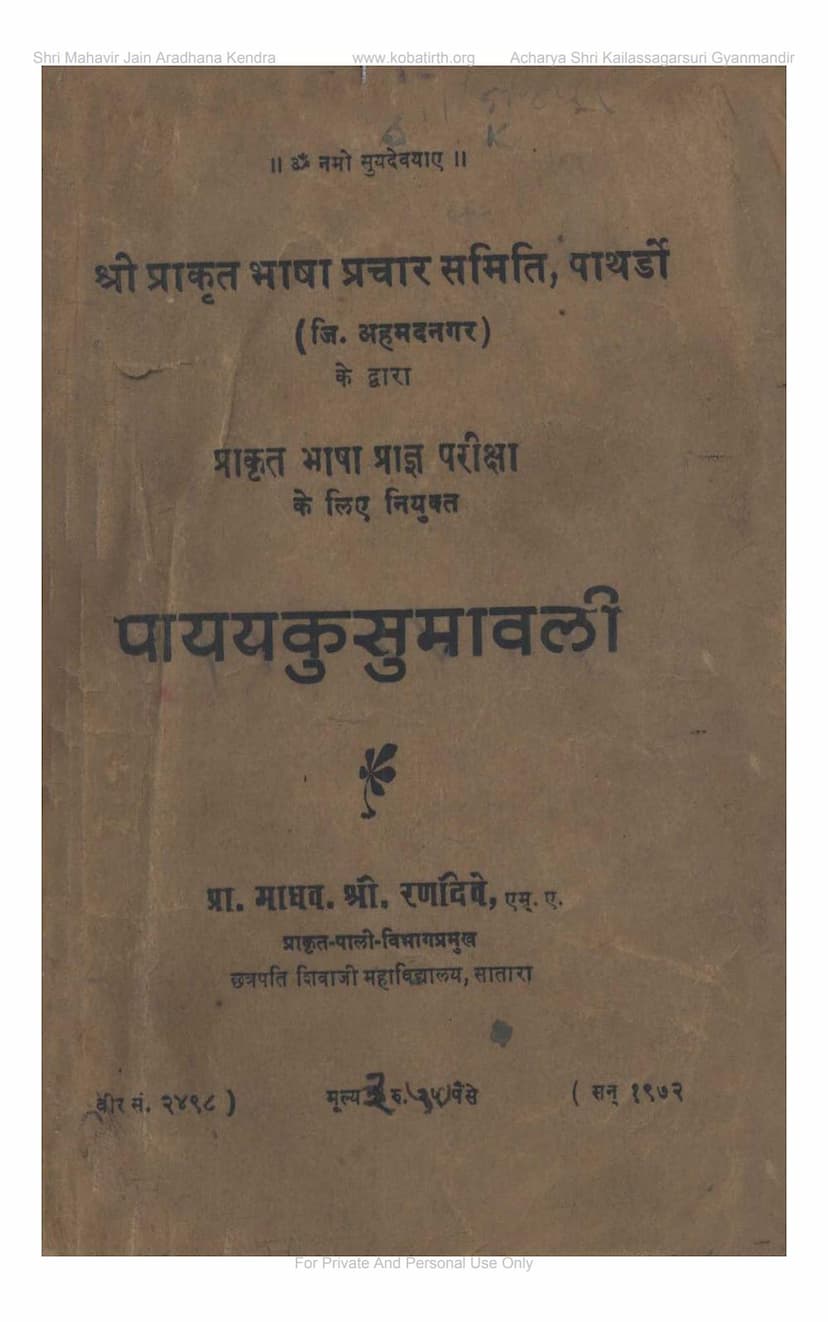Payaya Kusumavali
Added to library: September 2, 2025

Summary
"Payaya Kusumavali" (Pāyayakusumāvalī) by Madhav S. Randive, published by Prakrit Bhasha Prachar Samiti, Pathardi, in 1972 (Veer Samvat 2498), is a textbook designed for the Prakrit Prajna examination. This book aims to introduce students to the rich world of Jain literature in Prakrit, making it accessible and engaging for them.
The book is structured to provide a comprehensive learning experience, with each lesson featuring:
- Introduction: Details about the original text, its author, and its historical context.
- Original Text: The Prakrit passage itself.
- Difficult Word Meanings: Explanations of challenging vocabulary.
- Word-for-Word Translation: A literal translation to aid comprehension.
- Marathi Translation: A more fluent translation into Marathi.
- Correction Sheet (Shuddhipatraka): To address any errors found in the text.
The table of contents indicates a diverse selection of important Jain literary works, offering a glimpse into various aspects of Jain philosophy, ethics, and narratives:
- Kavimuni Charitam: The story of Muni Kapil, illustrating the dangers of excessive greed and the path to renunciation. It draws from the Uttaradhyayana Sutra and its commentary by Devendracharya.
- Kalacharya Katha: The life story of the renowned Jain Acharya Kalaka, focusing on his role in rescuing his sister, Sadhvi Saraswati, from the wicked king Gardabhilla, and his involvement in historical events related to the Shaka invasion. This narrative is compiled from various Jain traditions.
- Vivagadaruno Mayacharo: A tale illustrating the destructive nature of deceit and attachment, taken from Haribhadrasuri's Samaraichchhakaha. It focuses on the story of Soma and Rudradeva.
- Kamalai Kad'dame Sambhavanti: A parable emphasizing that good qualities can blossom even in adverse circumstances, based on the Vasudevahindi. It tells the story of Jambukumar and his wives.
- Kulavahu: A story about maintaining chastity and fulfilling one's duties, derived from Jayasinghasuri's Dharmopadeshamalavivaran. It highlights the resilience of a virtuous daughter-in-law.
- Sthavatyaputrasya Pavvajjya: The renunciation of Sthavatyaputra, illustrating the importance of understanding the impermanence of life and the path to liberation, as described in the Niyayadhammakaha.
- Damayanti Swayamvaro: A dramatic and engaging account of Damayanti's svayamvara (choice of groom), featuring the princes of the time, drawn from Somaprabhacharya's Kumarapalacharita.
- Padmavati Udayanassa Dinna: A poignant scene from Bhasa's Swapnavasavadatta, where Princess Padmavati's marriage to King Udayana is discussed in the presence of the disguised Vasavadatta.
- Mukhatvanasya Pahudo: A humorous episode from Dhanasyama's Anandasundari, showcasing the wit and wit of a jester and the king's appreciation for his antics.
- Namukkara Prabhav: A compilation of verses from various Jain texts highlighting the significance and power of the Pancha Namaskara Mantra.
- Vajjallagga: A collection of aphorisms organized into thematic "Vajja" (methods or styles), attributed to Jayavallabha. It covers topics like the plight of the poor, the valor of a lion, and the virtues of sandalwood.
- Ujjala Silo Dahamukho: An excerpt from Vimalasuri's Padmacharita, portraying the character of Ravana, a powerful Vidyadhara king, and his interactions with Nalakubara and Upasambhava.
- Bodhi Dullaha Katha: A cautionary tale illustrating the rarity of attaining true spiritual insight, drawn from Lakshmanagani's Suparshvanatha Charita, featuring a miserly merchant.
- Agadadattasya Sammanna: A story from Devendrasuri's commentary on the Uttaradhyayana Sutra, depicting the courageous feat of Agadadatta in taming a wild elephant and the king's subsequent honor.
- Appasaruvam: A lesson from Udyotanasuri's Kuvalayamala, explaining the nature of the soul through various analogies for the common populace.
- Karpuramanjari Shringaro: A passage from Rajshekhar's Karpuramanjari, describing the elaborate adornment of Karpuramanjari, highlighting the aesthetic sensibilities of the period.
- Pravachanasara: A collection of wise verses from Digambara acharyas like Kunda-kunda and Swetambara scriptures, summarizing core Jain teachings on renunciation, karma, and spiritual discipline.
The book's preface and introductory notes emphasize the importance of Prakrit language for understanding ancient Indian culture and languages, and highlight the commendable work of the Prakrit Bhasha Prachar Samiti in promoting its study. It is intended to foster interest in Prakrit language and literature among students and encourage them to pursue further studies in the field.